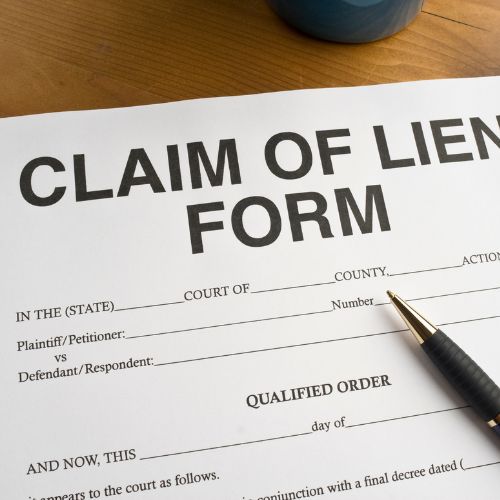Discovering a mechanics lien on your property title can ruin your whole day, and your bank balance. Every day unsuspecting property owners who trusted construction work they hired out was complete and all parties paid – learn differently. When a subcontractor or supplier goes unpaid, they may place a lien on your property – to collect the money they are owed.
What is a Mechanics Lien?
A lien ensures workers are paid before others in the event of a liquidation or business failure. The term “mechanics lien” goes back to early American times, when all construction workers were called mechanics. The lien is intended to force payment to workers who go unpaid for work performed or materials delivered.
Property owners may be the last to know a lien has been placed on their title. Liens may only be discovered when a refinance or sale of the property occurs. All processes are stopped – the lien must be paid or dismissed. Until the lien is resolved, you may be unable to refinance or sell your property. Eventually you could face foreclosure.
Removing Mechanics Liens Is Challenging and Complex
California homeowners grappling with mechanics liens will most likely need legal guidance to solve the problem. Here are the basic steps:
- Do Your Detective Work: Why was a lien placed on your property, and when? If you remodeled or recently purchased a newly constructed home, you assumed your financial obligation was complete when you paid your general contractor. Imagine your surprise when, for example, a lien for $7,500 was placed on the title to your home by a glass installer subcontractor who was not paid by the general contractor you already paid.
- Examine The Timeline: Some mechanics lien filers must first present a Preliminary Notice to the property owner and the general contractor. Sometimes this alone resolves the issue, but often not. The contractor or subcontractor then has 90 days from the last day on the job, or the delivery of materials, to file a lien in your county recorder’s office. The lien claim should include the amount owed as well as all pertinent details like the property address, etc.
- Study the Contractors State License Board Guidelines: The CSLB website contains a wealth of information regarding mechanics liens, including a link to the actual laws that govern liens.
Negotiate and Settle the Mechanics Lien
In a perfect world you would simply call your general contractor to discuss the lien. Perhaps the payment to the glass installer was overlooked or in dispute. Or, the general contractor is no longer in business or denies responsibility for the debt.
If you are unable to reach a solution, you may need to negotiate a settlement directly with the glass subcontractor. If agreement is reached and a payment is made, the glass installer can file a lien release with the county recorder’s office. Be sure to get your own copy of the filed release document which should clearly state the matter is resolved.
Legal Guidance for Mechanics Lien Disputes
It is usually this phase of the process to involve knowledgeable legal help. Most mechanics liens are much more complicated than the simple example presented here. Handshake agreements, misunderstood work orders, clerical errors and untrustworthy or incompetent individuals can all contribute to costly, protracted legal challenges. A real estate attorney can help you file a lawsuit against the claimant to decide if the lien is invalid.
You may be advised to obtain a lien release bond, which would enable you to remove the lien while the dispute is undergoing resolution.
- File the Lien Release: Once you obtain the lien release document, file it with your county recorder’s office in the county where the property is located. Your title will now be clear. Update any lenders or title companies involved with the lien to make sure all parties are aware of the resolution.
- Keep Records of Your Mechanics Lien Process
- It is best to communicate in writing, and keep all documents in order while the lien is in dispute. The small details of mechanics lien removal require a lot of attention to detail. If left unresolved, a mechanics lien can grow into larger legal issues later, which is another reason to seek competent advice from an experienced and knowledgeable real estate attorney.
Know Your Rights. Protect Yourself.


 (415) 533-0735
(415) 533-0735 (415) 843-0496
(415) 843-0496